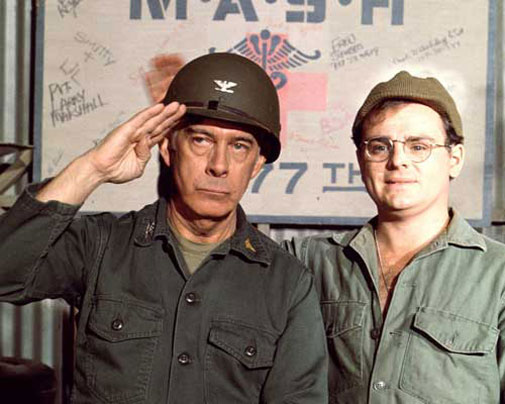
Harry Morgan, whose crusty yet friendly Colonel Potter on M*A*S*H was the pinnacle of a show-biz career that stretched to the early days of television and encompassed film and theater as well, died yesterday at age 96. What a character. What an actor. What a character actor...
It would be enough for any actor's career and obituary, perhaps, to have starred in the most-viewed scripted TV episode in history: the finale to CBS's M*A*S*H sitcom, an emotional movie-length 1983 sendoff titled "Goodbye, Farewell, and Amen."
Morgan's Col. Sherman T. Potter wasn't there at the beginning of M*A*S*H -- his character took control of the Korean War's 4077th Mobile Army Surgical Hospital at the start of the 1975 season, replacing McLean Stevenson, whose Henry Blake was written out of the show, quite dramatically, after McLean announced his intention to quit the series to seek bigger stardom elsewhere.
For Stevenson, that didn't work out so well. For the man born as Harry Bratsburg in 1915, however, it worked out great.
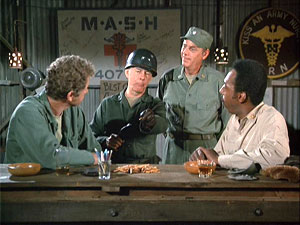
In lesser hands, that cast-change transition could have been clumsy, even rejected by audiences. But Harry Morgan, who had guest-starred on M*A*S*H the season before -- playing Maj. Gen Steele (at right), a very decorated but obviously deranged officer -- came in and was accepted instantly.
His relationship with the character of assistant Radar O'Reilly, played by Gary Burghoff (in photo at top, with Morgan), was a much warmer one than Radar's dynamic with his previous commanding officer. And as Radar embraced and felt protected and loved by Col. Potter, as a clear sort of father figure, so did many, many millions of TV viewers.
Morgan, in an interview for the Archive of American Television, called it "the best part I ever had, definitely." Here's a taste of that interview, which can be found in its entirety on YouTube:
If it seems odd to hear Morgan speak out of character, that's because he almost never did it. Except for speaking a few words of thanks when winning a Best Supporting Actor Emmy for M*A*S*H in 1980, Morgan didn't appear on TV as himself, on talk shows, ever. Not once, in a career that actually predated television.
M*A*S*H was, inarguably, Morgan's crowning achievement. Although he won only one Emmy for his work on that series, he was nominated for nine others.
His first Emmy nomination came for that single-shot guest role on the episode called "The General Flipped at Dawn." Then, once he joined the company full-time, he was nominated eight consecutive times (winning once) for his work as Col. Potter -- and also was nominated in 1980 for directing an episode.
And before Morgan was nominated for that M*A*S*H guest-role Emmy in 1975, he was nominated once before. Sixteen years before. In 1959, as a supporting actor on the sitcom December Bride.
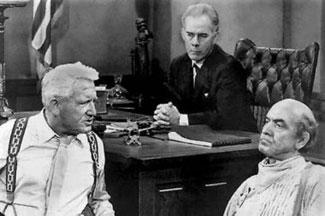
And even before that, in other venues, there were major triumphs. On Broadway in 1948, he appeared in the original production of Arthur Miller's All My Sons, with a couple of co-stars who just might be familiar: Burt Lancaster and Edward G. Robinson. His movie roles included attention-getting parts in 1943's The Ox-Bow Incident opposite Henry Fonda, 1952's High Noon with Gary Cooper, and as the Southern judge in 1960's Inherit the Wind (at right), with Spencer Tracy and Fredric March.
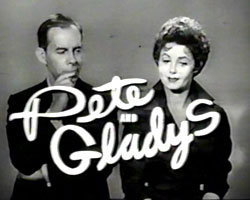
On television, Morgan found work in every decade in the latter half of the 20th century -- much of it very steady work.
From 1954-59, on the CBS sitcom December Bride, he played his Emmy-winning role of Pete Porter -- a character so popular he was spun off into his own series, Pete and Gladys (1960-62), with Cara Williams.
Also in the 1960s, in an early display of his strength as a replacement franchise player, he co-starred as the new partner of Jack Webb's Sgt. Joe Friday, in a new, color version of Webb's classic NBC Dragnet series.
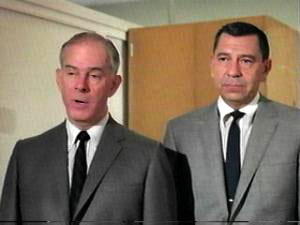
It was a revival of what was renamed, at first, Dragnet '67. Morgan's warmth played beautifully opposite Webb's clipped, robotic persona, and that series lasted, with appropriate titular changes, until 1970.
But other than M*A*S*H, the most impressive part of Harry Morgan's TV resume -- and the "missing link" which sorely needs to be exhumed, released and appreciated -- is his work as one of the cast members of The Richard Boone Show, a one-season NBC dramatic anthology series from 1963-64.
The Richard Boone Show was, I believe, unique in the annals of broadcast TV. Led and hosted by the former star of Medic and Have Gun, Will Travel, it was an anthology drama with a twist: It featured a repertory company of actors, who took turns starring in some episodes, being featured or bit players in others, and even sitting out some.
There were only 25 episodes made, one season's worth, and Harry Morgan appeared in 15 of them. Among his fellow cast members in this now-forgotten TV repertory troupe: Robert Blake.
After M*A*S*H, there was -- well, AfterMASH -- but the less said about that awkward CBS spinoff, the better. But to wrap up the century as a still-working actor, Harry Morgan played a recurring role, for a few episodes, on NBC's 3rd Rock from the Sun in 1996 and 1997, playing a rival professor opposite John Lithgow -- another much-appreciated character actor whose work, like Morgan's, encompassed stage, screen and TV.
Beginning Thursday at 7 p.m. ET, Me-TV is presenting daily tribute episodes of M*A*S*H featuring Harry Morgan as Col. Potter. The satellite and cable network isn't available everywhere, but you can find where to find it HERE.
But as a well-timed remembrance and holiday gift, we here at TV WORTH WATCHING are proud to recommend the complete, well-designed M*A*S*H boxed set, which you can order HERE.
What a show. And, for Morgan, what a career.